Main menu
Annual Report (April 2020- March 2021)
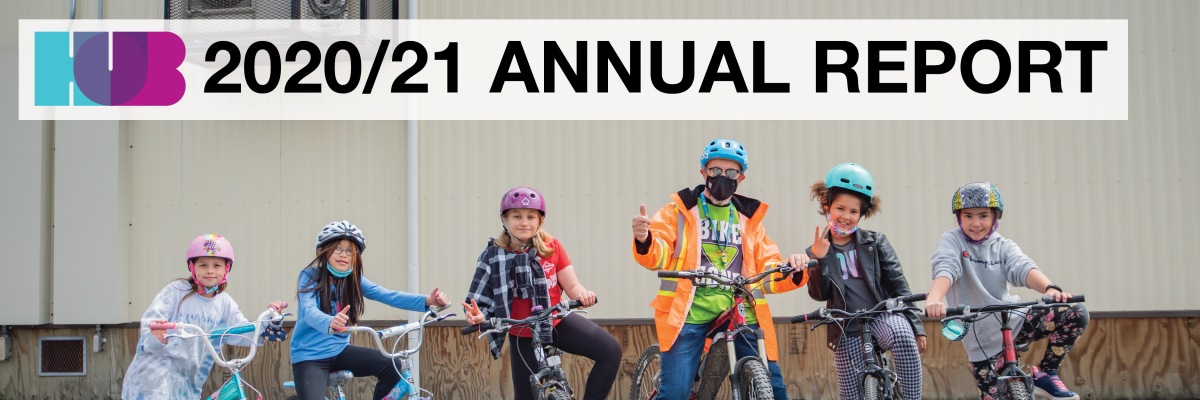
A MESSAGE FROM OUR PRESIDENT
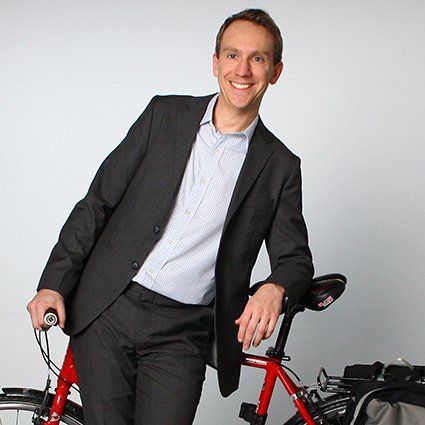
HUB Cycling’s 2020/2021 year was both challenging and productive. While a huge portion of our events and programs are typically in person, we successfully shifted many programs and meetings to a virtual format. Board meetings, board committees, local committees, and even many events went online.
Despite these roadblocks, we continued to grow our Bike Education program, delivering our standard programs (in-person and outdoors), as well as blended programs (online and outdoors) in a number of schools. In 2020, 1,800 students received our training and our goal is to more than quadruple that number in 2021. Our long-term strategy continues to be to deliver universal cycling education across the province.
Following our ground-breaking Benchmarking the State of Cycling in Metro Vancouver report last year, we continued to prioritize a data-driven approach to getting more people cycling. This included the development and release of the TransLink Metro Vancouver Cycling Map in early 2021 and the use of the State of Cycling data in our ongoing advocacy work.
We welcomed Erin O'Melinn back to her role as Executive Director, picking up where Navdeep Chhina, our Acting ED had left off, and welcomed four new board members with experience in law, municipal affairs, the provincial government, and the private sector.
The board created an entirely new “Board Mentee” position and in partnership with MOSAIC’s Social and Civic Engagement for Newcomers and Immigrants (SCENE) project, we brought on board Ouifaq, a keen cyclist from Morocco, who brought a fresh and diverse perspective on cycling.
We were able to continue our fiscally stable operations thanks to adjustments made by staff and board. You’ll see more on this in the Treasurer’s report in this report and in our AGM presentation.
On behalf of the board, I want to thank all staff and volunteers for their efforts in helping us move through this challenging time and continuing to help us get more people cycling more often.
- Derik Wenman
President, HUB Cycling
A MESSAGE FROM OUR EXECUTIVE DIRECTOR
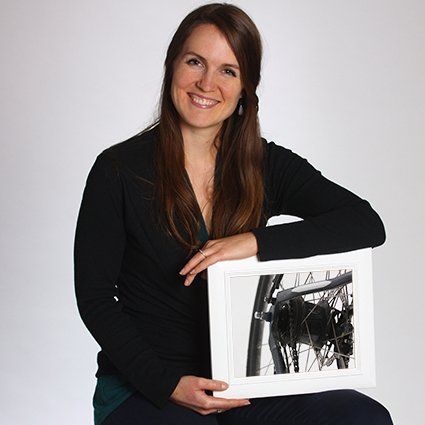
2020 was a year like no other! Along with the dramatic challenges that COVID-19 brought, cycling showed its resilience, helping overcome barriers to mobility, physical distancing, physical and mental health, and affordability. Cycling was a door-to-door solution that continued to get people outside when inside wasn't an option, moving their bodies when gyms and sports were shut down, and connecting with their neighbourhoods when real-world connection felt so far away. The only downside of the bike boom is bikes and parts are now so hard to find - everyone wants them!
The pandemic certainly didn’t slow us down. HUB Cycling:
- Launched Everyone Rides Grade 4-5 in Vancouver, Victoria and Kelowna areas and doubled financial support from the BC Government
- Launched Learn2Ride online courses for kids
- Motivated the connection of many more cycling network gaps and the reallocation of road space to active transportation such as Beach Avenue, Stanley Park, North Road, and Bayview Street to name a few
- Launched Streets for People in partnership with the City of New Westminster and Happy City, activating reallocated road space to support people walking, cycling and socializing in their communities through engagement and evaluation
- Redeveloped our Bike Friendly Buildings consulting services due to high demand to create better cycling end of trip facilities
- Delivered our first virtual Bike Awards event showcasing some important cycling improvements across the region
- Participated in more regular and frequent collaborations with government stakeholders and decision-makers than ever before
- Shifted local committee meetings to virtual and some saw significant growth in participation as well as new leadership from more diverse voices
Through all these avenues, HUB Cycling is achieving its mission to get more people cycling more often. Thank you to the volunteers, members, donors, staff, and Board that has made this all possible and helped us keep moving through a unique time!
- Erin O'Melinn
Executive Director, HUB Cycling
Our Voice: Our Supporters Make a Difference
HUB Cycling supporters, volunteers, and members continue to help give us a strong voice to make a positive impact on the cycling landscape of Metro Vancouver.
Our close to 2,000 individual members, 20,000+ social media followers, more than 43,000 newsletters subscribers, and 10 volunteer Local Committees amplify our message to make safe cycling a priority for all ages and abilities.
You can help amplify our voice by joining HUB Cycling.
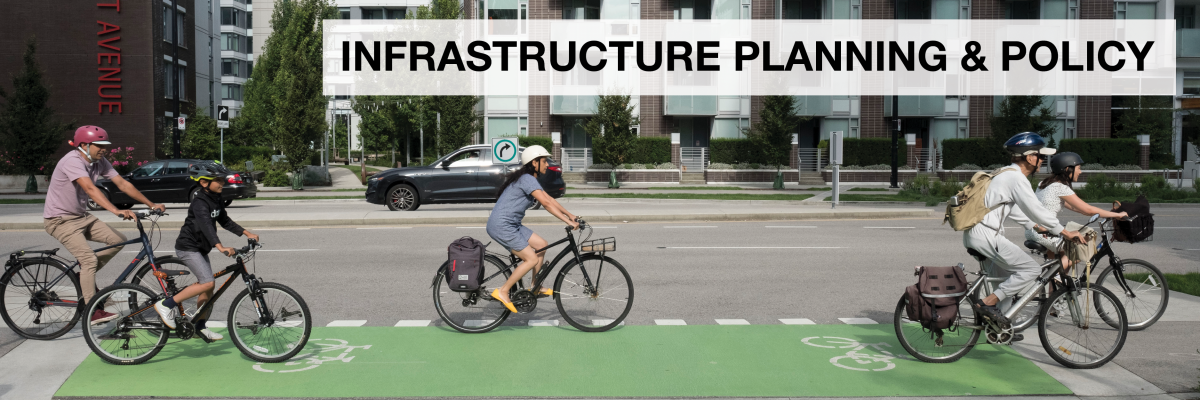
Infrastructure planning and policy work included some unexpected challenges from the pandemic this year and some positive action.
A number of infrastructure improvements were completed across the region, the #UnGapTheMap initiative continued strong with big plans for the future, and HUB Cycling was involved in numerous engagement activities with decision-makers, illustrating our growing influence.
Roads were re-allocated to active transportation across the region, including in North Vancouver, Richmond, New Westminster, and Vancouver. HUB Cycling organized a petition which garnered 2,500 signatures pushing for more road re-allocation. Some highlights of the road re-allocation include temporary bike lanes in Stanley Park, and bike lanes on North Road temporarily filling a gap on the Central Valley Greenway.
The City of Vancouver created over 50 kilometres of Slow Streets for people walking and biking.
Infrastructure Successes
In addition to temporary road reallocations, we were able to successfully advocate for permanent improvements across the region. A few highlights, among many key upgrades to the Metro Vancouver cycling network, include:
- Delta extended the Millennium Trail along Deas Slough
- Surrey added protected bike lanes on 64 Avenue and 160 Street
- Vancouver made the highly popular cycle path along Beach Avenue permanent and completed the first phase of the Richards protected bike lane.
At HUB’s annual bike awards, two projects won Infrastructure Improvement awards for improving safety, connectivity, and comfort on the cycling network:
- The City of North Vancouver won for upgrading West 1st/2nd Street to protected cycle lanes.
- A joint project between the Township of Langley and MoTI, the 216 Street project, won for both a multi-use path and protected cycle lane on each side of the roadway
#UnGapTheMap
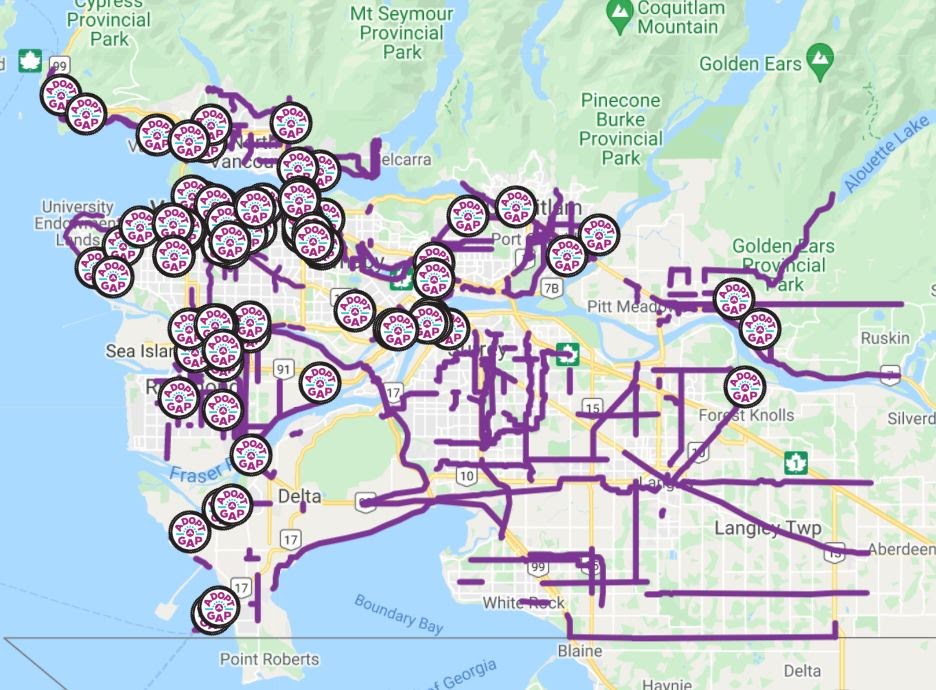
Building on the ground-breaking State of Cycling work, the #UnGapTheMap initiative is integrating the State of Cycling dataset with the Gap Priority List to leverage the strengths and improve the outcomes for each project. A prototype integration of the two datasets has been completed, with preliminary maps produced for all of HUB Cycling’s 10 local committees. HUB Cycling’s local committees will use these maps in their advocacy work to fill key gaps in the cycling network across the region.
HUB Cycling secured funding from The Bullitt Foundation to expand the #UnGapTheMap program, and continually improve its impact. As part of this, work is ongoing to:
- enhance the capacity and advocacy power of the local committees
- compile feedback for a refresh of the popular Infrastructure Challenge
- analyze the Metro Vancouver cycling network using an equity lens
- complete a cycle highway project.
The enhanced #UnGapTheMap initiative will also include a re-imagined Adopt-a-Gap program. This year, 16 gaps were adopted raising a total of $1,425 to improve cycling infrastructure in Metro Vancouver. This was accomplished despite the project being on pause most of the year. More than $11,000 has been raised through this initiative, with the adoption of 126 gaps. Once the integration of the State of Cycling and #UnGapTheMap databases is complete, the Adopt-a-Gap program will be fully updated and re-launched.
We will continue to work with municipalities, the provincial government, and funding partners such as TransLink to advocate for sustained high-level investment and action to resolve these crucial gaps. With your support, we could do so much more. To find and adopt current gaps in the network, click here.
20-in-20 Infrastructure Challenge
Despite a pandemic-related slow start, the 2020 Infrastructure Challenge was the most successful campaign to date. The 13 participants completed 115 Quick Fixes across the region, a record both for the number of fixes and participants since the Challenge began in 2018. The top three winners were chosen by a panel of judges: UBC transportation professor Alex Bigazzi, transportation planning manager Amy Choh with Binnie, and David Rønnov, an urban and transportation planner for the Office of Cycle Superhighways in Copenhagen. A finalist every year, the City of Burnaby claimed the top spot in 2020. The 2018 winner, the City of Surrey, won second place, and the City of Richmond finished third. The top winners and all participants were recognized and awarded at HUB’s February Bike Awards. Since its inception, 1,209 quick fixes have been submitted, and 284 fixes have been completed as part of the Challenge.
Local Committee Highlights
Barely slowed by the pandemic, HUB Cycling’s tireless 10 volunteer local committees continued their invaluable work pushing for better cycling infrastructure around the region.
Committee members consulted with the Ministry of Transportation and Infrastructure, met with tourism departments, Chambers of Commerce, municipal staff, TransLink, Metro Vancouver, and MLAs to advocate for increased funding, and filling gaps in the network.
Committees were actively involved in providing feedback and pushing for improvements on the Oak Street Bridge, Queensborough Bridge, new Pattullo Bridge project, Shoreline Trail project, Highway 7 corridor, Phipps Transit Exchange, Massey Crossing project, Broadway subway project, Beach Avenue, and Stanley Park temporary lanes, interim Agnes Greenway project, and Delta’s Cycling Infrastructure Study (initially a request from the local committee).
There were fewer in-person meetings due to COVID-19, but some committees still organized socially distanced rides and gatherings. Local committees sent 51 advocacy letters to city councils, municipal staff, Metro Vancouver, school districts, media outlets, MoTI, and provincial ministers advocating for better cycling infrastructure.
Recognizing the hard work of our local committee volunteers, three volunteers from Burnaby, Langley, and New Westminster were presented with advocacy awards at HUB’s 8th annual Bike Awards, with one winner featured in the local media. The City of Burnaby also recognized the local committee’s work with an environmental award.
Watch videos below or on YouTube to learn more about the advocacy work of each Local Committee. Each local committee's update video will be uploaded before the AGM.
Engagement Activity
Alongside the local committees' work, HUB Cycling staff and board members provided recommendations on a number of engagement activities, often by direct invitation.
HUB Cycling met with TransLink to discuss routes and the overall philosophy of the Major Bike Network and provided feedback on both Metro Vancouver’s Regional Recreational Greenways and Clean Air Plan and Climate 2050 engagement process.
HUB Cycling continued meeting regularly with provincial staff as well as elected officials, to advocate on numerous issues including:
- increasing funding for B.C. Active Transportation grants (formerly Bike BC)
- removal of P.S.T. on e-bikes (spoiler: removed!)
- development of a bicycle education toolkit, and
- ensuring adoption of the provincial cycling policy for all current and future projects
This year, HUB Cycling also released a position on rigid bollards (TL:DR - avoid using them!).
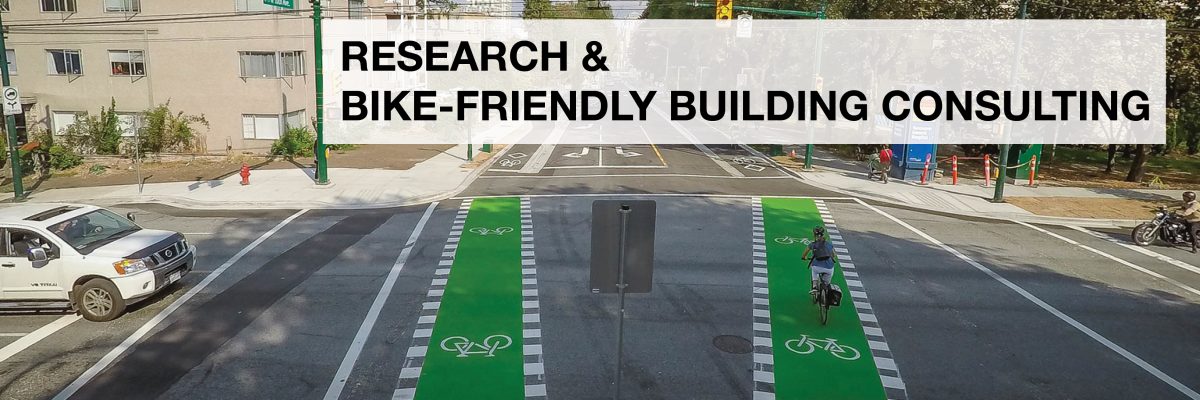
Research Highlights
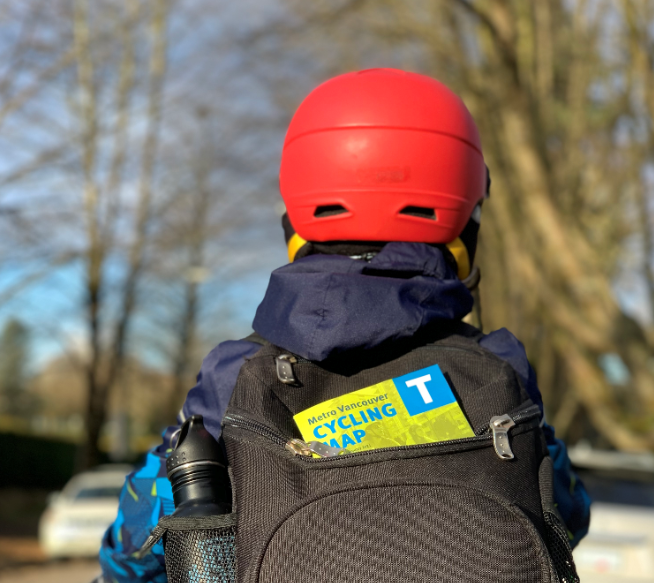
Building on the positive impacts of HUB Cycling’s State of Cycling project, during the last year HUB Cycling continued to improve and increase GIS data about our regional cycling network, and to develop a practical map for cyclists from the data. Working with TransLink, HUB Cycling gathered GIS information about all cycling infrastructure installations completed since the initial 2019 State of Cycling project.
Concurrently TransLink requested that HUB Cycling produce an online and print-ready, user-friendly cycling map, vastly improved over previous versions based on State of Cycling data. The map is now online on the TransLink website, and HUB Cycling produced over 13,000 hard copy maps and distributed them throughout Metro Vancouver with TransLink and VanCity funding support.
The opportunity arose in December for HUB Cycling to organize a research project into improving cycling dynamics for people living, working, or shopping in older buildings. QuadReal Property Group first approached HUB staff regarding its interest to fund a public interest research project on this topic, with a focus on equity and accessibility to cycling relative to new buildings. Concert Properties, Urban Racks, the Downtown Vancouver Business Improvement Association, and Bunt Engineering joined in providing project funding.
With the Cycling Equity and Older Buildings research project already well developed, and strong public and private sector collaborators confirmed, in March we applied for Real Estate Foundation of BC grant funding to expand project data collection. Spoiler for 2021-22: we were awarded the REF-BC $20k grant to launch the one-year project.
Bike Friendly Building Consulting Highlights
Over the last fiscal year HUB Cycling completed Bike Friendly Business consulting contracts for multiple Concert Properties projects, as well as for Wesbild, Boffo, and Park Royal. Early in 2021, we started a consulting project for Concert Properties’ major Whitgift development in Coquitlam, which is proving to be a dynamic and rewarding project improving cycling end of trip facilities. We confirmed by the end of March new BFB consulting projects for QuadReal’s “The Post” project in Downtown Vancouver, and for the New St Paul’s Hospital.
With BFB consulting services continuing to attract new and repeat clients, we moved forward with our collaborative project with Capilano University to place a senior business student with HUB Cycling to research and prepare a long-term business development and marketing plan so that we can reach more businesses to support building improvements that get more people cycling more often, for which we have received federal MITACS funding. We also continue engaging with TransLink’s new Transportation Demand Management team to identify mutual opportunities for the developer and municipal engagement.
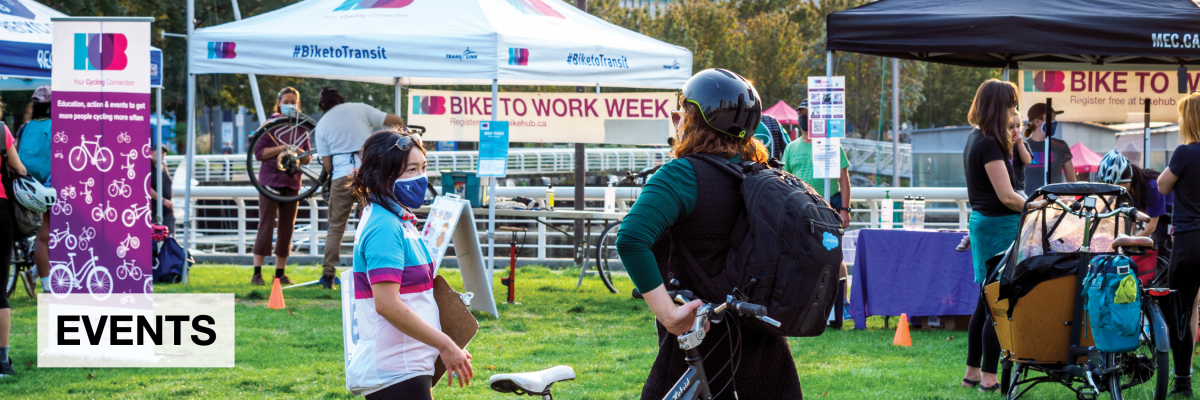
Go by Bike Week and Bike to Work Week
May 25-31, 2020 and September 28-October 4, 2020
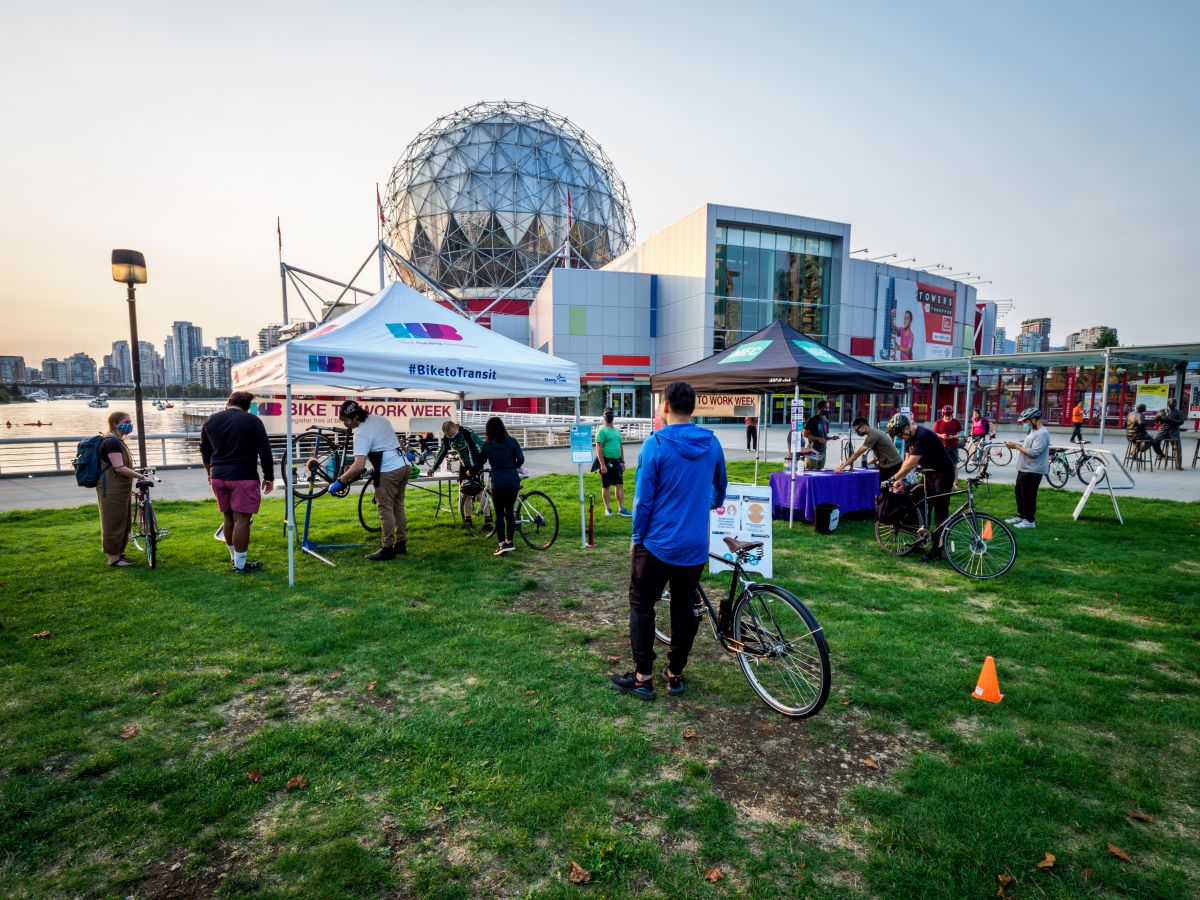
COVID-19 required HUB Cycling to reimagine how we engage with our communities and participants. In Spring 2020 we pivoted to a fully digital event called 'Go by Bike Week'. The event was held from May 25-May 31, 2020 with over 3,000 participants, 25 activations, and 30+ prizes. Our Fall Bike to Work Week offered a ‘hybrid’ of our traditional in-person event while building on the online successes of Go By Bike Week in May. The event was run a month earlier than previous years from September 28 to October 4, 2020.
The goals of the Fall Bike to Work Week were to:
- Encourage people to choose cycling as their commute mode of choice and to cycle safely when returning to the workplace or whilst continuing to work from home
- Encourage workplaces to support employees to cycle to work. Cycling is a great way to promote employee health and wellness during these difficult times.
- Support our local communities as we ‘restart’ B.C.’s economy
Spring Go by Bike Week Highlights:
3,052 total participants
48% women & non-binary participants
38,894 kg greenhouse gas emissions saved
179,362 km cycled during Go by Bike Week
Fall Bike to Work Week Highlights:
3,995 total participants
47% women & non-binary participants
63,204 kg greenhouse gas emissions saved
291,479 km cycled during Bike to Work Week
As part of our Spring 2021 Go by Bike Week, HUB Cycling partnered with our presenting sponsor MEC to offer free bike repair services to essential workers from Vancouver Coastal Health and BCCDC (BC Centre for Disease Control). The event was hosted outside next to Vancouver General Hospital cycling center in partnership with VGH on the Monday and Wednesday of Go by Bike Week. Safety protocols were carefully developed and implemented in consultation with VCH and BCCDC. 40 essential workers’ bikes were fixed as part of the initiative.
Bike to Shop
August 17 - 28, 2020
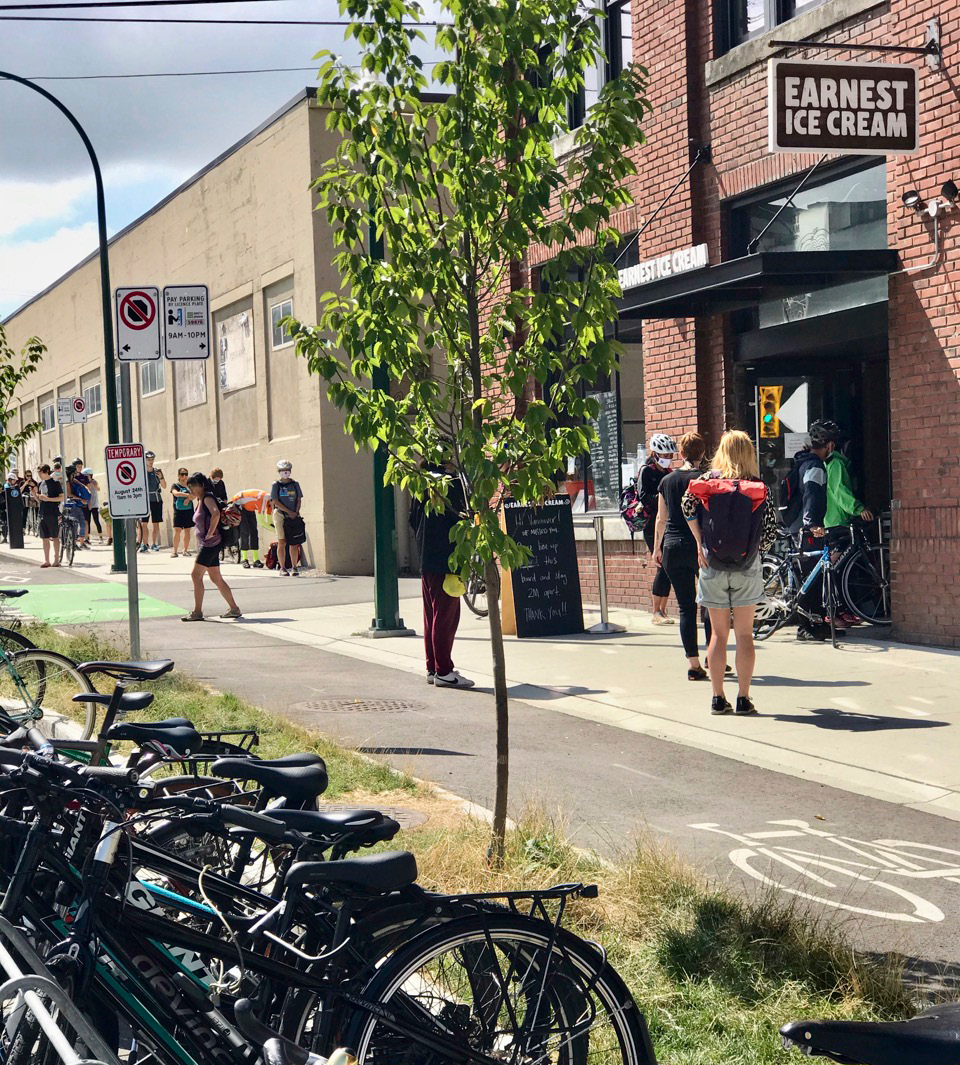
Since 2016, our Bike to Shop event has encouraged nearly 14,000 people to cycle to businesses in their local communities. Bike to Shop encourages people to explore their local businesses and areas by bike and aims to develop community between businesses and people on bikes.
COVID-19 required HUB Cycling to reimagine how we engage with our communities. Instead of congregating participants in central locations, we developed a one-week online behaviour change campaign followed by a Shop Local Challenge where we encouraged people to cycle directly to local businesses in Vancouver and Richmond in exchange for freebies! We also hosted a COVID-19 friendly Knowledge HUB at sunny and picturesque Science World.
Nearly 20 local Vancouver and Richmond businesses offered freebies to our Bike to Shop participants, offering 70 opportunities to get promotions over the week. 1400 people registered and we counted 250 people at our Science World Knowledge HUB.
Bike Awards
February 22, 2021
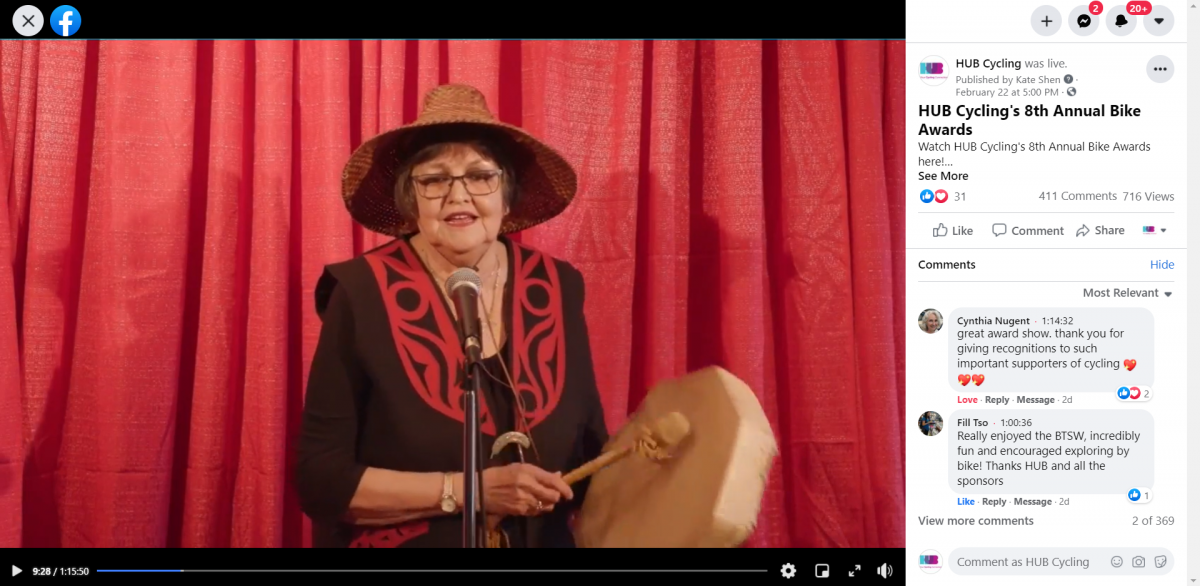
The 2021 HUB Cycling Bike Awards were a celebration of organizations and individuals that are making biking better across Metro Vancouver. This year, the 8th annual Bike Awards returned in a new, virtual format, and was free for everyone to attend! Over 300 people registered for the live event streamed on Facebook. The video remained on Facebook after it streamed and hundreds more have watched it since.
We were honoured to have Elder Ruth Mary Adams from the Tsawwassen First Nation perform a welcoming ceremony.
New this year, we also introduced the People’s Choice Award category to give people an opportunity to recognize individuals and organizations that have been spearheading improvements in their community. More than 100 people nominated bike shops, organizations, and individuals in their community who went above and beyond to make cycling safer and better.
All of our winners can be found on our website here.
Bike to School Week
September 28-October 2, 2020
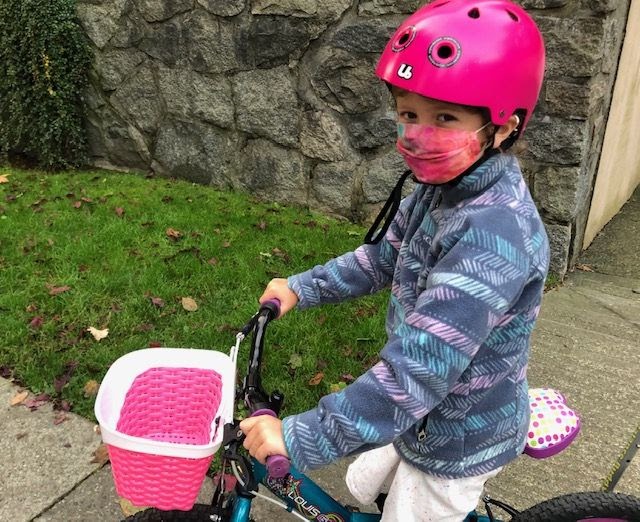
This year’s Bike to School Week was unlike any other with the presence of the COVID-19 pandemic and school closures during the event’s typical dates, but that didn't stop our School Champions from encouraging active travel at their school. 71 Metro Vancouver Schools celebrated Bike to School Week from September 28 - October 2, 2020. 77% of schools who participated in the event said they were motivated to take part because they wanted to keep school culture alive during a very different year with COVID-19, and they definitely succeeded! Check out event highlights below.
Key Highlights:
- 71 schools participated
- 11 schools participated for the first-time
- 14 schools used our online tracking tool at btww.ca
- 12,234 bike trips were recorded (an average of 197 trips per school)
- 4,137 riders participated (an average of 66 riders per school)
- 10,144 other active travel trips recorded (walking, scootering, skateboarding, etc.)
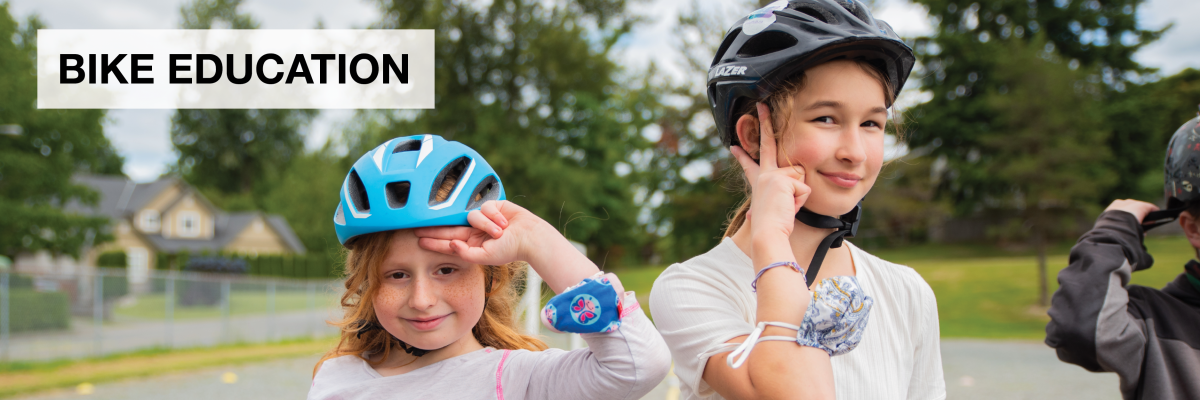
StreetWise
HUB Cycling’s StreetWise program has traditionally provided in-person cycling training, in partnership with community organizations, for hundreds of Metro Vancouver residents annually. Most partners were not able to offer much in-person programming. As such 3 new webinar courses (Intro to City Cycling, Intro to Biking with Children, and Fall & Winter Cycling) were developed and offered 12 times to the public or to workplaces throughout Metro Vancouver. When possible, some small group and individual in-person courses were still offered from July to October. From brand new riders to those who cycle every day, we sought to engage with a wide range of people of all ages and abilities, in whatever capacity was safe and comfortable for participants throughout the spring, summer, and early fall.
Key Highlights:
- 265 participants reached
- 16 courses taught
- 598 total hours of participation
Bike to School
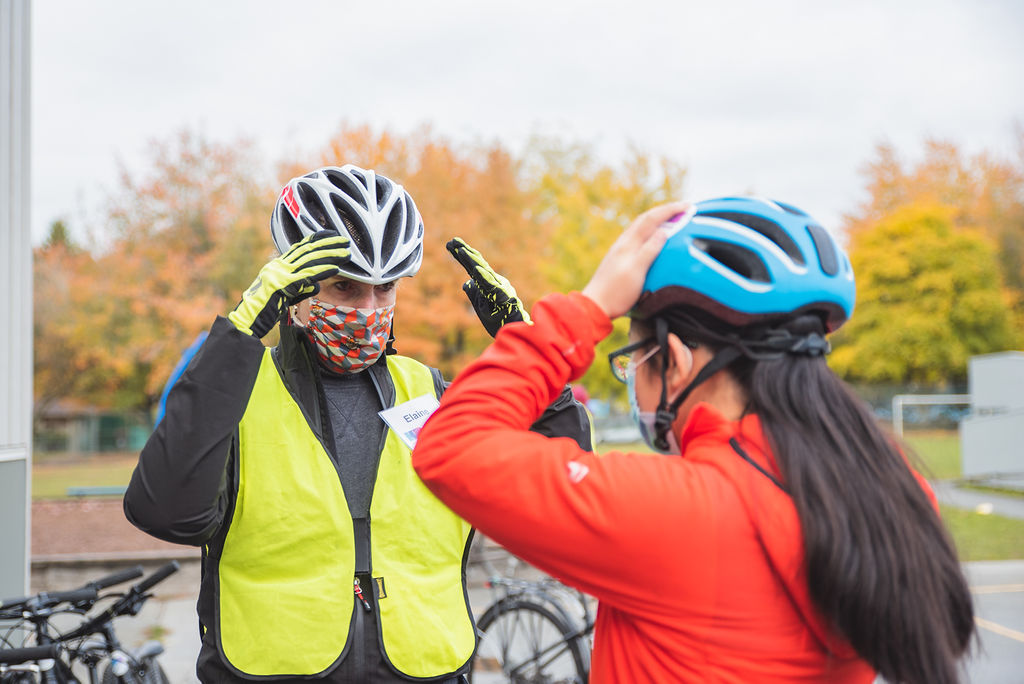
HUB Cycling’s Bike to School program enables and encourages thousands of Metro Vancouver youth annually to see cycling as a safe and enjoyable mode of transportation in their community. In 2020, the Bike to School Program was drastically impacted by the suspension of in-class learning throughout BC schools from April to June. We adapted by offering an at-home online course - Learn2Ride Online - starting in June, which 91 participants completed over the summer. Before schools resumed in the fall, in-school courses were modified to offer a new blended online + outdoor lessons. Unfortunately, a delayed start, combined with a reluctance to host outside programs and the complete cancellation of the spring season resulted in overall participant numbers dropping by 88%. But by testing and refining different delivery methods over the smaller fall season, Bike to School prepared for a large increase in courses in the Spring of 2021.
Key Highlights:
- 1,241 youth received an on-bike program
- 613 youth completed an online cycling safety course
- 7 municipalities reached
- 14 schools reached
- 4,842.5 total hours of participation
Everyone Rides Grades 4-5
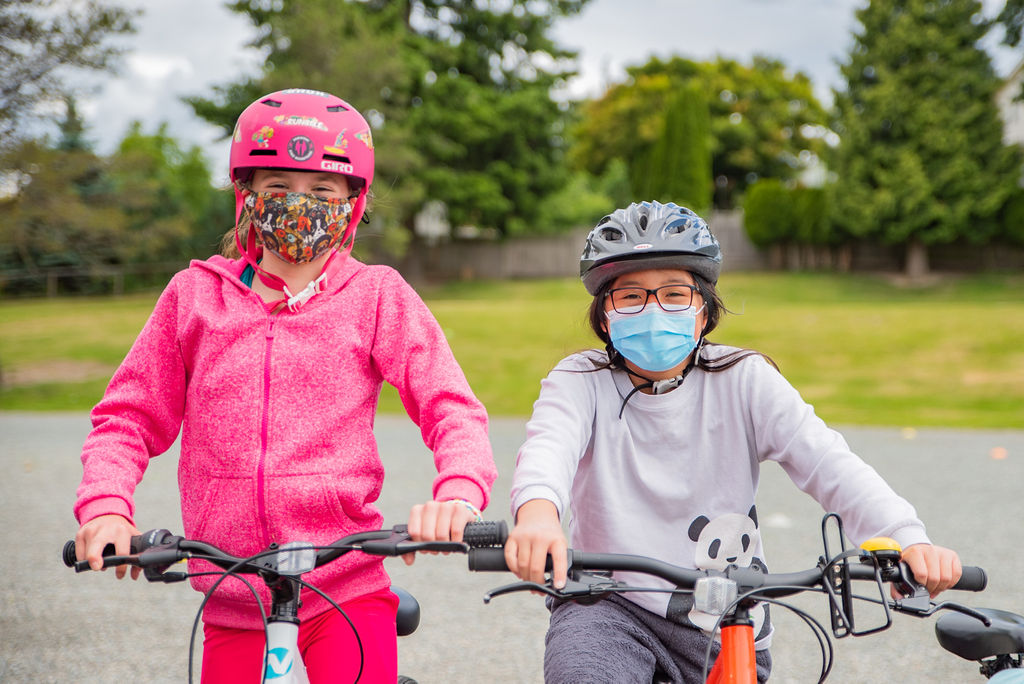 Despite the many challenges associated with launching a new provincial cycling education program during a pandemic, Everyone Rides Grade 4-5 successfully set up two new program delivery partners in Kelowna and Capital Regional District/Victoria area (CRD) and offered in-person courses during a delayed pilot in the fall. Together, our partners were able to provide 18 courses to almost 1,500 students, while HUB focused on developing and launching online courses to support blended delivery and independent learning for youth throughout BC. In January, the Ministry of Transportation and Infrastructure renewed their commitment to the program for 2021, with an increase to 80 schools and approximately 8,000 grade 4 & 5 participants in Metro Vancouver, South Okanagan and Southern Vancouver Island, and surrounding areas.
Despite the many challenges associated with launching a new provincial cycling education program during a pandemic, Everyone Rides Grade 4-5 successfully set up two new program delivery partners in Kelowna and Capital Regional District/Victoria area (CRD) and offered in-person courses during a delayed pilot in the fall. Together, our partners were able to provide 18 courses to almost 1,500 students, while HUB focused on developing and launching online courses to support blended delivery and independent learning for youth throughout BC. In January, the Ministry of Transportation and Infrastructure renewed their commitment to the program for 2021, with an increase to 80 schools and approximately 8,000 grade 4 & 5 participants in Metro Vancouver, South Okanagan and Southern Vancouver Island, and surrounding areas.
Key Highlights:
- 1,496 youth received an on-bike program
- 18 courses taught
- 3,740 total hours of participation
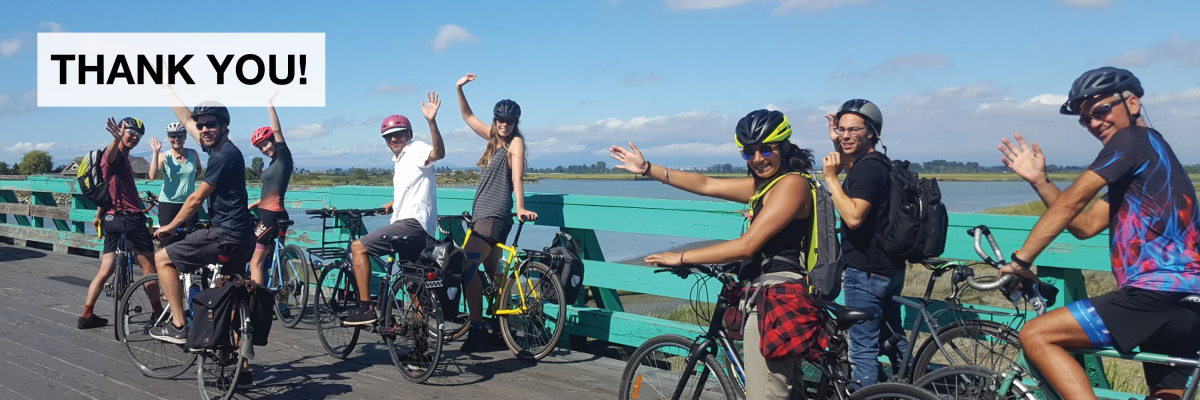
We'd like to thank our Local Committee Chairs:
- BURNABY: Cathy Griffin, Moreno Zanotto
- DELTA: Neil Pope, Roel Schootman
- LANGLEY: Mitchell Nurse (2021 Update Video)
- MAPLE RIDGE - PITT MEADOWS: Barry Bellamy, Ivan Chow (2021 Update Video)
- NEW WESTMINSTER: Andrew Feltham, Garey Carlson
- NORTH SHORE: Don Piercy, Jay Jardine
- RICHMOND/YVR: Cat Rey, Anna Chow, Stephen DesRoches
- SURREY / WHITE ROCK: Tim Yzerman, Colin O'Byrne (2021 Update Video)
- TRI-CITIES: Andrew Hartline, Colin Fowler, Kathryn Berry-Einarson (2021 Update Video)
- VANCOUVER / UBC: Jeff Leigh (2021 Update Video)
Our Board of Directors:
- Derik Wenman, President
- Jeff Leigh, Vice President
- Matthew Alexander, Treasurer
- William Skinner • Jean Lawson • Paul Kennedy • Sherry Zhao • Genevieve Bowers • Julie Facchin • Matt Strand • Shareen Chin • Tai Silvey, Directors at Large
- Corrie Bownick, Director Emeritus
And our wonderful Individual Members, Organizational Members, and Donors!
